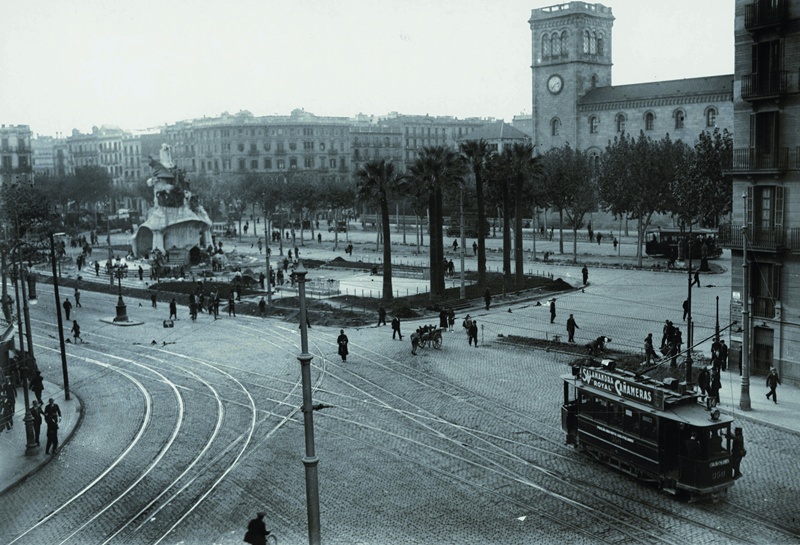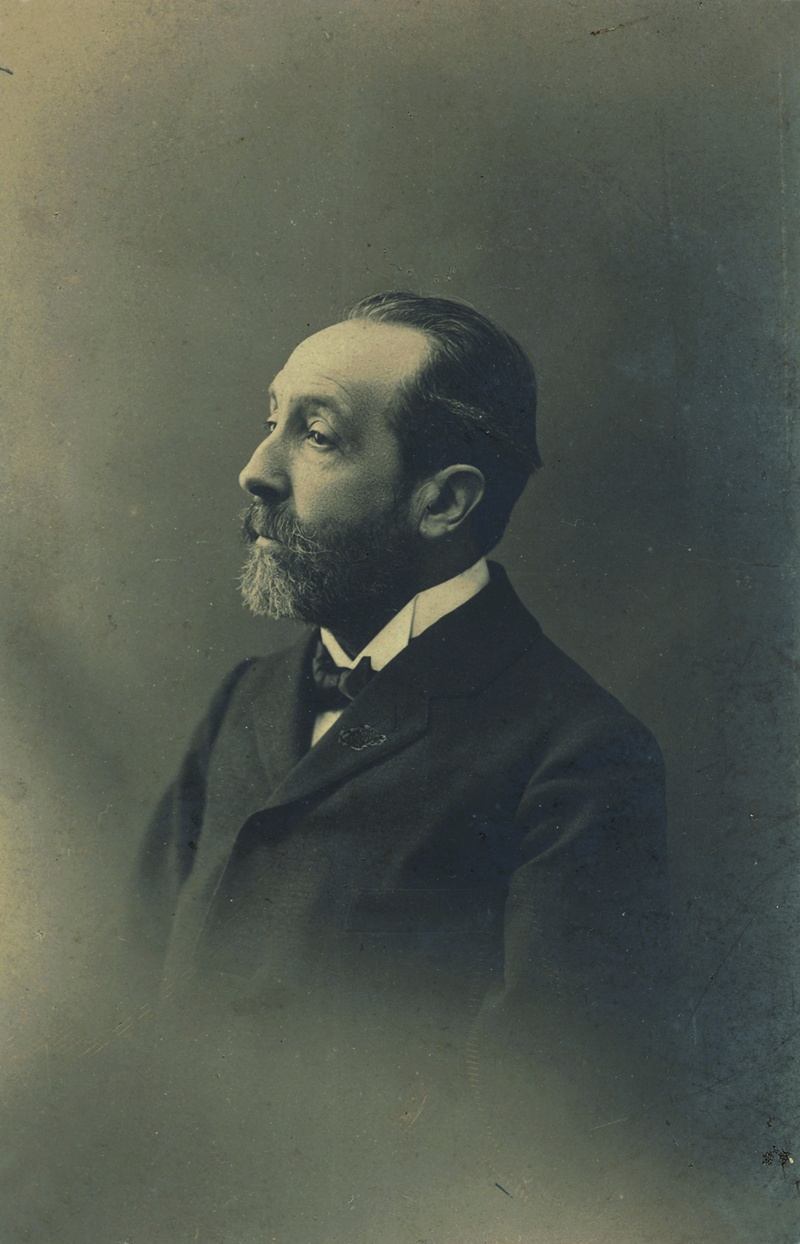Bartomeu Robert i Yarzábal (Tampico, 1842 – Barcelona, 1902) was an unusual character. Commonly known as Doctor Robert, he turned local politics in Barcelona on its head for the seven months that he led the City Council, a period that culminated in the mayor indignantly shutting the cashboxes and encouraging taxpayers to stop paying their dues to Madrid.
The case of Doctor Robert is unique and exceptional. Never has a mayor of Barcelona left such a deep mark on the city and in such a short time. He devoted himself to politics for only the last three years of his life, but in just seven months as mayor of Barcelona, this honest, measured, pragmatic man of medicine, who students at the Medical School remembered as “the calm lecturer”, took the city’s political and social context in a completely new direction.

© Ajuntament de Barcelona
A tribute to Dr Robert that took place on 14 April 2012 to mark the 110th anniversary of his death.
After an irreproachable career in science that stretched over almost 30 years, Doctor Robert – Catalan on his father’s side, Mexican by birth and with his roots in Sitges – had become a popular name in the world of medicine. He had followed in the family footsteps to become a doctor and after a brilliant career as a physician and lecturer, he set himself up as the reformer of medical teaching and practice in Catalonia in the final quarter of the 19th century. At the same time, he was also a committed citizen of Barcelona, a member or chairman of numerous civic, cultural and scientific organisations in the city.
However, the impact of the crumbling of the Spanish Empire in 1898 (the loss of the Imperio’s last overseas colonies) with the resulting political withdrawal of the Spanish state and its ultimate confinement within its peninsular borders, led him to discover Catalan nationalism. This sudden political awareness would turn him into an atypical pioneer of Catalan nationalism and, as a result, lead him to make his outrage about centralism public, as mayor of Barcelona.
Shortly after the military defeat, in November 1898, Robert, as a member of the general public, noticed the hardening of the centralist policies of the government in Madrid. He was one of the individuals who signed a message endorsed by a number of Catalan financial and cultural institutions and addressed to Queen Regent Maria Christina, asking for “broad administrative decentralisation”. This was clearly an unexpectedly severe criticism of Madrid’s central government system, issued by a group of citizens that also asked for the state to be regionalised. With this unique political background and his professional prestige and reputation for civic-mindedness, honesty and altruism gained during three decades as a practising physician, Doctor Robert was appointed mayor by royal decree on 14 March 1899. It was an unprecedented event in the history of Barcelona, particularly as he was a novice in the world of politics. A section of the Madrid press, in irritation, asserted that this Barcelona doctor was a “separatist”.
To top it all, the central government headed by Prime Minister Silvela-Polavieja had just been formed with the support of the minister for grace and justice, the prestigious lawyer from Barcelona, Manuel Duran i Bas, promising to carry out a process of regeneration and decentralisation. Doctor Robert was to play a major role in this: his term as mayor only lasted seven months, but it was intense and controversial and unexpectedly eventful. When the new mayor heard of the discriminatory tax and budget proposals forwarded by the minister for the public treasury, Fernández Villaverde, he hit the roof. He was outraged, not just as a mayor, but as a citizen: Madrid’s impositions and push for centralisation seemed to him like a frontal attack on Barcelona.

© Josep Domínguez / AFB
The Plaça de la Universitat in a photo taken between 1929 and 1932, showing the monument dedicated to him by the city, which was the work of Josep Llimona.The Franco government removed it in 1940, but following Franco’s death, it was restored and installed on its current site on Plaça de Tetuan in 1979.
Doctor Robert, inexperienced and with no well-defined political profile, was bitterly disappointed. First of all, he could not understand it. A few days after being sworn in, he set himself the goal of fighting “on moral grounds” against this drive for centralisation that he considered completely unjust and to free Barcelona from the local political chiefs in Madrid. Robert was outraged and put out a call to the public to stop paying taxes. In the blink of an eye, he turned the whole system upside down and got the taxpayers of Barcelona to declare a state of civil disobedience. This was an unprecedented historic event.
The call met with an unexpected level of successful and dissemination. Dozens of traders, particularly shopkeepers, joined the movement, as well as a sufficient number of small-scale industrialists, who also were committed to withholding their tax payments. The intransigence of the Madrid authorities drove the outraged citizens to radicalise their position, which in September 1899 culminated in a tax strike and an absolute refusal to pay local property taxes, just as the mayor had wanted: what became known as the tancament de caixes (shutting the cashboxes). This unexpectedly turned Doctor Robert into the most popular political figure in Catalonia.
In the midst of the conflict (a significant political and social upheaval, with the businesses, shops and smaller factories of Barcelona committed to suspending payment of their taxes to Madrid) Doctor Robert, instead of shrinking away, continued to give his unconditional support to the guilds involved in the revolt. That was even more unusual and surprising. From his mayoral office, this forerunner of the Indignados or Outraged movement tried to halt and hinder the central government’s coercive and repressive measures with all manner of crafty political and administrative moves.
Doctor Robert’s tug of war with Madrid reached an unsustainable point and on 22 October, he tendered his resignation for reasons of civil dignity and consistency with his ideals. The exceptional nature of this gesture created a wave of support and tributes around the city – a degree of public backing never seen before which, along with his own fleeting experience as mayor, unexpectedly put him right in the middle of a Catalan nationalist movement that was just beginning to grow.
In the rebellious wake of the shutting of the cashboxes that he had caused, this spokesman for the famous protest of Barcelona was chosen to be member of parliament for the Regionalist League almost immediately afterwards. Indeed, he was the most voted-for member in the Barcelona constituency, but he was also the visible leader of an historic turnaround because he represented the reclaiming of largely hijacked rights through popular suffrage. The former mayor headed the political birth of Catalan nationalism in the Spanish Parliament. In Madrid, they did not know what to make of it.
Two days after taking up his post, on 17 July 1901, Doctor Robert made his first speech in response to the message from the Crown. The Spanish parliamentarians were bewildered. Nonetheless, his debut was a success, contrary to what was expected. His skill and elegance as an orator and his didacticism, both firm and conciliatory, earned him the respect of the House. This newcomer, with all the ease in the world, had just normalised the presence of Catalan nationalism in Spanish parliamentary life.
In November 1901 he was chosen to lead the 20th century’s first major debate on the “Catalan issue”. Didactic, serene and calm, he called for something rather surprising; for a model of the state as an organisation of autonomous regions. He used a phrase that astounded the House: the purpose of this model was so that “in Catalonia, we may govern ourselves”.
On 10 April 1902, his sudden death from a heart attack turned Doctor Robert into a legend; a pioneer of a peaceful, honest and courageous way of doing politics. It won him lasting public recognition and earned him a spectacular monument, currently located at the Plaça de Tetuan in Barcelona.





Hay una cosa que no cuadra en el relato, si era un furibundo anticentralista y escribe contra la política de Madrid y fomenta la insumisión fiscal por razones morales, ¿cómo se explica que sea el gobierno de Madrid quien lo nombre Alcalde con la sanción real? Si además, como se dice en el texto, el caciquismo venía de Madrid, ¿cómo es posible que se nombre a un enemigo del caciquismo Alcalde para que combata contra él?
Cada vez estoy más convencido que la manipulación de la Historia es de tal calibre que ya no se entiende nada ni de Catalunya ni de España. Este cuento mítico preñado de adjetivos superlativos e interpretaciones aleatorias es un signo más de la manipulación de los pseuhisoriadores que ensalzan y esconden datos de forma descarada.
Parece que comenzais a leer de abajo a arriba. Era una persona conservadora, que por su prestigio como médico fue requerido por Alfonso XII para tratar sus dolencias y poe eso fué el propio rei quien propuso que le dieran la alcaldia de Barcelona. Fué posteriormente que Robert se dió cuenta que el gobierno de Madrid queria poner unos impuestos a los contribuyentes de Barcelona, para poder resarcirse de las pérdidas económicas que tenía España al haber perdido las colonias. A partir de ahí, se puso al lado de su pueblo y se opuso tanto como pudo al cobro de tales impuestos. Dimitió por coherencia al no poder evitar que el ministerio de hacienda del momento embargase a los rebeldes comerciantes y pequeños industriales. Después se convirtió en un defensor del descentralismo administrativo de las regiones.
El hecho de que no os guste la historia, no quiere decir que no haya sido así. Lo que tenéis que hacer antes de negar unos hechos, puramente porque no os gustan,es contrastarlos. Podéis tirar de hemeroteca, que no está manipulada y podréis ver cómo sucedieron los hechos.
Otra cosa es que queráis ser ignorantes y no tengáis ningún interés en dejar de serlo.
Y ni una palabra en todo el artículo de catalanismo racial. Consideraba a los españoles no catalanes de una raza distinta y menos evolucionada. La Historia de Cataluña está tan adulterada, que es imposible de reconocer.
El centralismo de países sudamericanos ha resultado nefasto para su desarrollo. Así hay ejemplos de una Argentina federal q gobiernos centristas frenaron el crecimiento de sus Provincias, generando fuertes frustraciones de crecimiento.
No puedo ser totalmente objetivo en esta nota al haber tenido un abuelo Reig Robert. Por otra parte está España
me cautiva y la siento tierra mía. Solo el deseo q siga grande y sus políticos claros y transparentes.
soy nacido en tampico mexico, lugar donde nacio el dr robert yarzabal, por eso me apasiona la biografia del dr robert como patologo, auxilio a alfonso xii con un problema en la sangre, infeccion y lo curo, a cambio la alcaldia de barcelona. El dr Robert es el padre de catalanismo, tuvo el valor de no pagar impuestos a Madrid, quito las cajas, por eso en 7 meses de su gobierno se gano la admiracion del pueblo de Barcelona, dios bendiga al tampiqueño mexicano dr robert
Por lo que he leído su padre era catalán y su madre vasca aunque nació en México.